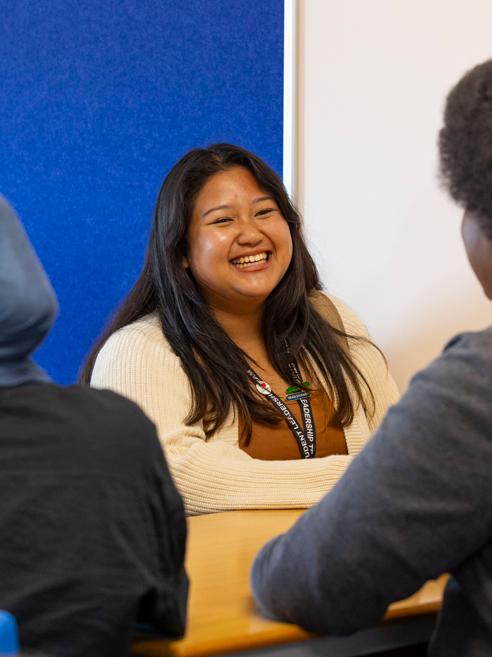




MR C. JEFFERIES: ASSISTANT HEADTEACHER (HEAD OF SIXTH FORM)
cjefferies@harlingtonschool.org
tel: 02085691610 extension 304
MR P. JANA: HEAD OF YEAR 12 (2025-26)
pjana@harlingtonschool.org
tel: 02085691610 extension 310
MS C. YOUNG: HEAD OF YEAR 13 (2025-26)
cyoung@harlingtonschool.org
tel: 02085691610 extension 311
MS K. CULVERHOUSE: SIXTH FORM STUDY MANAGER
kculverhouse@harlingtonschool.org
tel: 02085691610 extension 206
Welcome
Careers
Destinations
Life in the Sixth Form
Course Information
Art, Craft & Design
Biology
Business
Chemistry
Classical Civilisation
Computer Science
Economics
English Literature
English Language GCSE
Extended Project Qualification
Film Studies
French German Geography
& Ethics
At Harlington, we are extremely proud of our Sixth Form students and the vibrant contribution they make to everyday school life. Achievement is very high, with almost half of all A Level grades being between A* to B. This enables the majority of our students to progress to university; many of them to the most prestigious Russell Group institutions. We strongly proclaim to be amongst the most successful post-16 providers in the borough of Hillingdon; for the summer examinations of 2023 we were adjudged to have the highest rates of KS5 progress in the borough.
Our Sixth Form students join us having attained a wide range of academic achievements in Year 11 from both our own KS4 and from a wide range of other schools (nearly 20% of our Year 12 cohort are derived from other institutions). We are an inclusive Sixth Form and believe in offering a fresh start for all. We firmly believe all students, whatever their starting point and whatever their histories, can progress in KS5 and aspire to high standards; though we understand some students may need to take longer to get there than others. Through fostering this approach and encouraging everyone to aim high, our students are empowered to make excellent progress during their time in the Sixth Form. Our Year 13 leavers annually achieve excellent results relative to their starting points and move on to study a wide range of courses including Medicine and Law at university.
Our success has led to considerable growth over the years, which has necessitated a considerable increase in our course offer. Our academic programme is augmented by vocational courses in IT and Sport Science. This year we are launching our Football Academy that aims to develop high skilled football players, while also allowing them to gain Level 3 qualifications. Our most able students are assisted in their applications to the high ranking university institutions by studying for an additional Extended Project Qualification (EPQ). We presently have around 20 Students undertaking EPQ.
Our curriculum offer is further supported by a comprehensive enrichment programme that includes the Duke of Edinburgh Award, Art for Fun, CISCO and Enterprise. The Sixth Form at Harlington is a purposeful and supportive place to study. We continually seek to review our provision in order to best serve the needs of a diverse school population. We feel strongly in the notion of students undergoing the full ‘Sixth Form Experience’ and we hope you will see Harlington as the right place for you.

“Students make good progress in the Sixth Form, as a result of effective teaching. The sixth form is well led.”
Our Sixth Form students are guided and challenged to ensure they achieve. We want them to be successful and happy. To that end, students can ask for help and expert advice from our experienced on-site Career Adviser.
Students are encouraged to match their abilities and personal characteristics in a realistic way to their career choice. There is the opportunity to survey a wide range of options with our own Careers Adviser. Students wishing to go to work after their studies are complete, will be helped through the process of applying for a job. Those that wish to go to further or higher education will be assisted every step of the way with their college or UCAS applications. Specific guidance is provided to Level 2 students who are writing their CVs and completing application forms for college and employment. All students will also undertake a work experience placement at the end of Year 12.
Students are supported with their applications and time is set aside during PSHE periods for essential preparation. Tutors are available towards the end of the summer term to help complete UCAS statements. An annual Careers Fair is organised by our careers adviser and local HE providers, employers and government agencies are invited into the school. A variety of information is available to help students make the correct choices.
We believe the majority of our students should be joining our Sixth Form with the long term aim of applying to university. University study is not for everybody and we do offer support in gaining work experience, apprenticeships and employment for those who feel further study is not for them. However, we do have an academic focus and encourage most students to aspire to, and plan for higher education from very early on in their post-16 studies.
We offer:
• Annual visits to open days (we have recently visited Warwick , Sussex and Portsmouth en-masse);
• Annual group visit to the Skills Show (Ascot)
• Annual group visit to Oxford University (all science students);
• Annual visit from the Student Finance Road Show team;
• Introduction to Higher Education session for parents and students;
• Tutorial sessions focusing on aspects of the application process;
• Higher Education Seminar (student finance, how to choose courses, how to choose universities, how to get work experience, how to log-in to UCAS);
• Application and interview skills seminars for those aspiring to ‘Selective’ universities;
• Mock interview practice;
• Bespoke programmes aimed at supporting applications to Oxbridge/Medicine courses;
• On-line application support;
• Annual work experience programme for all Year 12 students (one week in March);
• Visiting speakers focusing on a wide range of university-related issues including; ERASMUS (European university exchange programme) personal statement writing, applications for STEM subjects etc.
• Access to a specialist Careers Adviser.
“Sixth formers remark on the strength of relationships and the support they receive in gaining university places.” OFSTED
Royal Holloway, University of London Business & Management
Brunel University London Engineering with an Integrated Foundation Year with Placement
Brunel University London Economics & Management
SOAS University of London Law
Royal Holloway, University of London Law
City, University of London Diagnostic Radiography
University of Birmingham Politics & International Relations
Keele University Computer Science & Neuroscience
Brunel University London Law
Kingston University Computer Science & Artificial Intelligence
The University of Law Law
University of Westminster, London Cyber Security & Forensics with Foundation
University of Greenwich Cyber Security & Digital Forensics
The University of Law Accounting with Finance
Royal Holloway, University of London Criminology & Psychology with a Year in Industry
Queen Mary University of London International Relations
Royal Holloway, University of London Business & Management
Kingston University Computer Games Programming
Brunel University London Business Management with Entrepreneurship
Royal Holloway, University of London Law with a Year in Industry
Kingston University Business Management & Entrepreneurship
Royal Holloway, University of London Electronic Engineering
Brunel University London Computer Science (Software Engineering)
Royal Holloway, University of London Computer Science with Integrated Foundation Year
University of Westminster, London Computer Science
Royal Holloway, University of London Law
Queen Mary University of London Economics & Finance
Northumbria University, Newcastle Psychology Foundation Year
Brunel University London Games Design
St Mary's University, Twickenham Computer Science
London Southbank Electronic & Electrical Engineering
Kingston University Mechanical Engineering (Automotive Engineering)
University of Surrey Aerospace Engineering
Brunel University London Engineering with an Integrated Foundation Year with Placement
The University of Law Law
Kingston University Sport & Exercise Science (Nutrition) with Foundation Year
Royal Holloway, University of London Financial & Business Economics with a Year in Business
Kingston University Accounting & Finance
Royal Holloway, University of London Law with Integrated Foundation Year
St Mary's University, Twickenham Business Management & Marketing (with Placement Year)
University of Reading Business & Management
Brunel University London Computer Science (Artificial Intelligence) with Placement
Royal Holloway, University of London Accounting & Finance with a Year in Business
University of the Arts London Product & Furniture Design
Goldsmiths, University of London Computer Science (Integrated Degree)
Royal Holloway, University of London Business & Management
Kingston University Cyber Security & Digital Forensics (with Sandwich Year)
Kingston University Biomedical Science
City, University of London Healthcare: Nursing Associate (Direct Entry)
Royal Holloway, University of London Accounting & Finance
University of Bournemouth Psychology with Counselling
Brunel University London Mechanical Engineering
Nottingham Trent University Law
University of Portsmouth Science with Foundation Year
Brunel University London Computer Science (Artificial Intelligence) with Placement
Istituto Marangoni London Fashion & Design Foundation
University of West London Cyber Security
Kingston University Computer Science
University of Central Lancashire Bioveterinary Sciences (with Foundation Year)
Royal Holloway, University of London Economics & Management with a Year in Business
University of Reading Law with Foundation
Kingston University Biomedical Science with Professional Placement
Brunel University London Computer Science (Network Computing) with Placement
Royal Holloway, University of London Accounting & Finance
Royal Holloway, University of London Business & Management
University of West London Computer Science (with Foundation)
Queen Mary University of London Politics with Business Management
Brunel University London Computer Science (Software Engineering)
Brunel University London Computer Science (Software Engineering)
City, University of London Introduction to Diagnostic and Therapeutic Radiography
University of Portsmouth Digital Radiography
Royal Holloway, University of London Geography
Royal Holloway, University of London Mathematics with Statistics
We set high expectations of our students. The onus is on the individual to make the most effective use of their study time in order to maximise their chances of success. During study periods, all students are expected to work quietly in order to allow for a calm and purposeful atmosphere. Year 12 students are expected to work in the Sixth Form Common Room and may ‘earn’ greater freedoms if they are deemed to be performing well in their studies. In early November, teachers will assess all students and supply progress data; those who are well on track are rewarded with a door fob that allows students to leave the site during the school day. In order to aid the transition from GCSE to post-16 study, all students must complete a set of learning tasks related to each of their courses during the summer holidays. There is a significant focus on study skills in Sixth Form assemblies during the first term. Each student has a personal tutor who will academically mentor them throughout the duration of their time in the Sixth Form. All students are expected to attend a study skills seminar in the Autumn Term.
Students with special educational needs are encouraged to continue their education in the Sixth Form and they will receive advice and guidance on appropriate courses of study on application. Harlington has exceptional facilities, which cater for pupils with disabilities, including full access to all areas for wheelchairs and a physiotherapy room where students can receive their medical treatment during the school day. Students experiencing difficulties will be offered support with coursework and given guidance on study skills and examination techniques.
As you will no doubt be aware, in the current challenging economic climate, entry into both university and the job market is extremely competitive. Therefore students need to gather rounded skills and attributes that set them apart from others in addition to their standard academic achievements. We strive to ensure all students develop their interpersonal skills and offer a wide ranging enrichment programme.
CURRICULUM ENRICHMENT
In addition to their main courses, students are expected to follow two enrichment activities. Students may select from: EPQ, the Duke of Edinburgh Award, Enterprise, Art For Fun, Journalism (school newspaper), Sport and Fitness, Cooking.
VOLUNTEERING
Our students collectively give back to the school and to the local community. Our sixth formers provide in-lesson support to students in Years 7, 8 and 9 and always provide assistance at school events such as parents’ evenings and open evenings. Our students work closely with a local engineering company called RWC. In partnership with RWC students have undertaken clean-ups in the local community, participated in Black Lives Matter events, in conjunction with The Stephen Lawrence Trust and Wine into Water - a project focusing on water filters for developing nations.
Sixth Form students actively contribute to wider school life through leading the School Council. The Stu-dent Leadership Group comprises of the Head Boy & Girl and Deputy Head Students. Sixth Form students may also be selected to act as part of the ‘Prefect Team’. Sixth Form students take a lead on organising school events such as productions and charity-related activities.
Sixth Form students take a lead role organising events such as the Fusion talent show, the school production and fundraising events for Children in Need, Comic Relief and Sports Relief. This year our student leaders have set up a food bank.
Sixth Form students have their own debate club which meet once per week. Our students won the first ever Hillingdon Post-16 debating competition. Recently our students excelled in our first ever entry into the MACE schools debating competition. Debating is part of the Year 13 PSHE programme.
SPORT & FITNESS
Students have use of the on-site sports centre and GOALS.
Students undertake a variety of trips related to their subjects. Each year, for example some of our A level History students visit Auschwitz and the A Level Art students recently visited Paris. In recent years our students have also visited Dublin and Madrid. Closer to home students have visited the Design Museum, the Houses of Parliament, the Old Bailey, the Globe Theatre and the IMAX Cinema.
Our Year 13 students organise a Summer Leaver’s Ball. This is always a terrific and popular event which is attended by most students and a large number of staff. In the summer term all students attend a leavers’ barbeque with their teachers.
We seek to deliver rewarding enrichment opportunities. This ranges from timetabled sessions including the Duke of Edinburgh Award, Art for Fun, Music for Fun, Journalism group and Enterprise to curriculum-related trips such as annual field trips and university visits. In the Spring term all Year 12 students undertake a one week work experience placement which helps to support their progression into employment or Higher Education following their KS5 studies.
We set high expectations of our students. The onus is on the individual to make the most effective use of their study time in order to maximise their chances of success. During study periods, all students are expected to work quietly in order to allow for a calm and purposeful atmosphere. Year 12 students are expected to work in the Sixth Form Common Room and may ‘earn’ greater freedoms if they are deemed to be performing well in their studies. In early November, teachers will assess all students and supply progress data; those who are well on track are rewarded with a door fob that allows students to leave the site during the school day. In order to aid the transition from GCSE to post-16 study, all students must complete a set of learning tasks related to each of their courses during the summer holidays. There is a significant focus on study skills in Sixth Form assemblies during the first term. Each student has a personal tutor who will academically mentor them throughout the duration of their time in the Sixth Form. All students are expected to attend a study skills seminar in the Autumn Term.
Formal trousers
Formal skirts (knee length)
Formal dresses (Business style)
Formal shirt (with a collar)
Cardigan (no motif)
Jumpers (no motif)
Shoes (formal leather-type)
Ties
Dark coats (not to be worn inside)
Suits or suit jackets
T-shirts or crop-tops or off-the-shoulder tops
Shorts
Hooded tops
Clothing with a motif that is larger than a £2 coin
Trainers/flip-flops
Hats/caps
Jeans/jeggings/leggings
Tracksuit bottoms or tops
Outdoor coats
‘Loud’ outdoor coats
Headphones
There is an overall expectation for students to dress tidily and tastefully. All students in Years 7-11 wear uniform and all staff adhere to a dress code. In keeping with this, Sixth Form students’ attire should generally be of a formal nature.
A dedicated team of sixth form students continue to make a huge difference to the progress of our younger students by giving some of their valuable free time to mentoring. This collaboration benefits both groups as our Sixth Formers learn additional skills and our young students receive one to one support in areas of study that they find more difficult.
Year 12 students can apply to join the Prefect Team. This team of students hold responsibility around the school including supporting staff with break/lunch duties, organising and overseeing charity events and helping to run our School Council. In Year 13 students can apply to join the Student leadership Team. This comprises of the Head Girl, Head Boy and a team of deputies. The Student leadership Team represent the voice of the students in all years of the school and meet on a regular basis with the Headteacher.
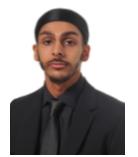


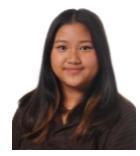

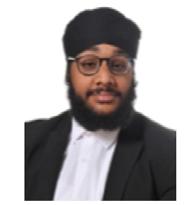
Sixth Form students will enjoy the luxury of a dedicated study suite. This will include IT access via a bank of PC’s and laptops. Students must show respect for others in the study room; accordingly students are expected to work quietly. Students also have access to their own refectory that serves snacks and drinks from mid-morning until early afternoon.
IT facilities can be access throughout the day and long after the normal school day has finished. Where a student has no lessons during an afternoon they are permitted to independently study at home. Students are expected to make good use of their time. Our recommendation is for students on A Level courses to undertake around five hours additional study per subject per week.
“Older pupils are given opportunities to develop their leadership by being members of the student council, and through volunteering at the breakfast club.” Ofsted
You will have the opportunity to speak to the subject teachers on Open Evening and are encouraged to study the information on the individual subject pages that follow. If you have any further questions regarding the subjects on offer, please contact the teacher listed.
Though we offer a fresh start for all learners, we feel it is vitally important for students to be placed onto courses in which they will achieve success. Some schools cynically allow students onto post-16 courses with very low entry criteria. We believe this is done in order to generate more funding for the school and with a disregard for the best intentions of the students. We refuse to do this at Harlington, believing that it is better for a student to study courses we know they will do well at given the results they have already achieved. Some courses are much more challenging than others and therefore a variety of entry criteria for courses exist. In general students must aim for 5 GCSE passes at grade 4 or above (including good grades in English Language and Mathematics) in order to qualify for Level 3 study. However, some courses require grades that are higher than this.
We ask prospective students to complete an on-line application form. Application forms are on the website. If you are unable to complete an on-line application you can collect a paper copy of the form from school. Please complete and return paper forms to Ms K Culverhouse, Sixth Form Study Manager, Harlington School, Pinkwell Lane, Hayes, UB3 1PB
Courses listed in this prospectus are dependent on enrolment numbers. Under normal circumstances we would consider courses to have 10 students or more to be viable options. Should courses look to have low numbers we will do all we can to ensure students are given forewarning that such courses may not end up being timetabled as planned.


AQA
METHOD OF ASSESSMENT: Coursework unit and externally set exam (15 hours )
ENTRY REQUIREMENTS: 4 in English & 3 other subjects at 4 or above (to include 6 in Art, Photography or Textiles)
This is a broad-based course exploring practical, critical and contextual work through a range of 2D and/or 3D processes and media. Art, craft and design gives you the skills and knowledge to create personal and imaginative work. You can choose to focus on a specialist area of study from a variety of exciting processes and media to suit your individual interests and abilities. If you have an adventurous, creative and enquiring mind and are excited by shaping and determining the visual world around us, there is a career opportunity waiting for you.
A-level Art, Craft and Design is a practical courses in which you learn by doing, so you will be able to create imaginative personal work. You will find out about a whole range of media, techniques and processes. You will develop your creativity and independent thought, learn to express yourself visually and let your imagination flourish. Art, craft and design is a great companion to all other subjects as creativity, imagination and problem solving skills can give you great ideas for your other subjects. Much of the work is of a personal nature and requires students to think and act independently both in school and at home. During the course, students are expected to visit galleries as well as attending other Art Department trips.
Component 1 : Personal Investigation - you will develop work for a personal investigation into an idea, issue, concept or theme supported by written material. This will count for 60% of your total A-level marks. Set and marked in school moderated by AQA visit.
Component 2 : Externally set assignment - you will produce personal work in response to one of eight exciting starting points which will count for 40% of your total A-level marks Preparatory period plus 15 hours supervised time. Set by AQA, marked in school, moderated by AQA visit
Possible Degree options - Architecture, Art conservation, Art history, Art therapy, Fashion design, Film/video production, Fine art, Graphic design, Illustration, Interior design, Jewellery design, Photography, Product design, Textile design, Theatre design, Three-dimensional design, Web design.
Possible career options - Studying an art, craft and design related degree at university can give you all sorts of exciting career options, including Animator, Architect, Art therapist, Art restoration, Cartoonist, Computer game designer, Community arts worker, Exhibition designer, Fashion designer, Film/video maker, Fine artist, Furniture designer, Graphic designer, Illustrator, Interior designer, Jeweller, Museum/gallery.

EXAM BOARD: AQA
METHOD OF ASSESSMENT: Written Examination
ENTRY REQUIREMENTS: 6 in English and Maths & 4 other subjects at 6 or above (to include 7, 7 in Science subjects at GCSE)
Year 1
Unit 1: Biological molecules
Unit 2: Cells
Unit 3: Organisms exchange substances with their environment
Unit4: Genetic information, variation and relationships between organisms
Year 2
Unit 5: Energy transfers in and between organisms
Unit 6: Organisms response to changes in their internal and external environments
Unit 7: Genetics, populations, evolution and ecosystems
Unit 8: The control of gene expression
Biology A level is a linear assessment, with all exams at the end of the course. There are three examination papers which will test your knowledge, understanding and application of the above topics. There will also be 12 required practical tasks which will be assessed in the three written exam papers. 15% of the A-level marks will be for practical knowledge and understanding.
Biology is a useful subject for anyone intending to pursue a career in any branch of medicine or veterinary science or in many areas of biological or biochemistry research. It is also a good choice for the non-scientist and combines well with Geography and Psychology

EXAM BOARD: AQA
METHOD OF ASSESSMENT: Written Examination
ENTRY REQUIREMENTS: 4 in English and Maths & 3 other subjects at 4 or above (5 in GCSE Business/ Merit in BTEC Level 2 or above).
The A level Business course is structured into four themes and consists of three externally examined papers. Stu-dents are introduced to business in Themes 1 and 2 through building knowledge of core business concepts and applying them to business contexts to develop a broad understanding of how businesses work. Breadth and depth of knowledge and understanding, with applications to a wider range of contexts and more complex business information, are developed in Themes 3 and 4, requiring students to take a more strategic view of business opportunities and issues. Students are encouraged to use an enquiring, critical and thoughtful approach to the study of business, to understand that business behaviour can be studied from a range of perspectives and to challenge assumptions.
Year 12
• Theme 1: Marketing and people
• Theme 2: Managing business activities
Year 13
• Theme 3: Business decisions and strategy
• Theme 4: Global business
ASSESSMENT
Each exam paper has two sections and students will be expected to answer all questions. The duration of each exam is 2 hours and 100 marks is available.
• Paper 1: Marketing, people and global businesses (35% of the total qualification)
• Paper 2: Business activities, decisions and strategy (35% of the total qualification)
• Paper 3: Investigating business in a competitive environment (30% of the total qualification)
This course provides progression to higher education or employment.

EXAM BOARD: AQA
METHOD OF ASSESSMENT: Written Examination
ENTRY REQUIREMENTS: 6 in both English and Maths & 4 other subjects at grade 6 (to include 7, 7 in science subjects at GCSE)
Chemistry is the subject of elements and of the compounds they form. It is a subject that leads you to where your imagination can take you. Mathematics is very much involved in chemistry, mainly algebra. It is a challenging but interesting subject and it is brilliant when you can really get to grips with a problem, e.g. preparing a sub-stance and then carrying out tests to confirm that it is the substance that you have made. Some, or, most of the substances that have been formed by chemists have been formed by luck or by mistake e.g. ammonia gas. Chemistry is essential to study Medicine, Dentistry, Veterinary Medicine and Pharmacy. It is advisable for any other para-medical or biological degree course as well as some engineering courses. The skills learned in chemistry are also highly valued in the study of Law/ Accountancy/Science/Information Technology.
COURSE CONTENT
Physical
Chemistry Atomic structure
Amount of substance
YEAR 1
Bonding
Energetics
Kinetics
Chemical equilibria Kc and Le Chatelier’s principle
Oxidation, reduction and redox equations
Inorganic chemistry Periodicity
Group 2, the alkaline earth metals
Group 7, the halogens
Organic chemistry
Introduction to organic chemistry
Alkanes
Halogenoalkanes
Alkenes
Alcohols
Thermodynamics
YEAR 2
Rate equations
Electrode potentials and electrochemical cells
Acids and bases
Properties of Period 3 elements and their oxides
Transition metals
Reactions of ions in aqueous solution
Optical isomerism
Aldehydes and ketones
Carboxylic acids and derivatives
Aromatic chemistry
Amines
Organic analysis
Polymers
Amino acids, proteins and DNA
Organic synthesis
Nuclear magnetic resonance spectroscopy
Chromatography
Chemistry A level is a linear assessment, with all exams at the end of the course. There are three examination papers which will test your knowledge, understanding and application of the topics below. There will also be 12 required practicals which will be assessed in the three written exam papers, contributing towards 15% of the A-level marks.
Biology is a useful subject for anyone intending to pursue a career in any branch of medicine or veterinary science or in many areas of biological or biochemistry research. It is also a good choice for the non-scientist and combines well with Geography and Psychology.

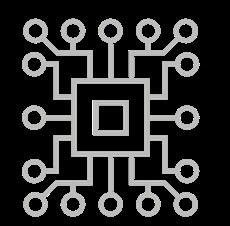
EXAM BOARD: OCR
METHOD OF ASSESSMENT: Written Examination
ENTRY REQUIREMENTS: 5 in both English and Maths, 5 in history or RE desirable. 4 other subjects at grade 5
A-Level Classics is an opportunity for an immersive journey into the captivating worlds of Ancient Greece and Rome. Delve into politics, philosophy, history, art, archaeology and literature, building transferable skills applicable to any career. Analyse primary and sec-ondary sources to enhance critical thinking and analytical prowess. Gain insights into con-emporary societies by understanding the origins of democracy, governance, and societal norms. This interdisciplinary course spans history, philosophy, politics, literature, art, and archaeology, broadening your knowledge base for diverse academic and career paths. A unique blend of enriching experiences and preparation for future academic and professional opportunities awaits. The course will be primarily led by Mrs Pîrvulescu, who has a joint 2:1 bachelors degree in Ancient History and Philosophy from Royal Holloway University of London, and a master’s degree in Ancient History from University College London (UCL). Mrs Pîrvulescu has spent one year preparing for the launch of the course, and in her preparation has recently won a scholarship allowing her to continue her study of the subject and pass this knowledge onto future students.
At Harlington School, we will be studying the OCR Classical Civilisations A-Level and the modules will include:
The Odyssey: The Odyssey is one of Homer’s epic poems, a literary treasure that has profoundly influenced Western literature and culture. Studying this poem in-depth will allow students to engage with timeless tales of heroism, adventure, and the human condition. We will begin Year 12 reading and analysing the Odyssey, how themes intertwine and what the relationships are between the deities of Ancient Greece and our heroes. We’ll look at the Trojan War, Odysseus’ journey home and the wider context (touching on Ancient Greek language) and the influence of the Odyssey on modern society through the study of scholarly opinion.
Greek Religion: Religion was an integral part of ancient Greek society, impacting politics, ethics and daily life. Understanding it provides crucial contexts for comprehending ancient Greek culture and its influence on the modern world. In year 12 we’ll be studying the ancient deities, sacred archaeological sites, art and literature to gain a better understanding of its influence on life in Ancient Greece.
The Aeneid: Authored by Virgil, stands as one of the greatest epic poems in world literature. It narrates the epic journey of Aeneas, a Trojan hero, and his quest to establish Rome. Studying this in Year 13 will allow you to deep dive into Roman cultural identity and the foundational myth of Rome’s origins. The poem is renowned for themes like destiny, duty, piety and the costs of empire-building. The analysis of these themes will not only allow you to bridge the gap between Greek and Roman cultures but give you valuable insights into ethical and moral dilemmas, resonating with contemporary discussions.
Imperial Image: Finally in Year 13 we’ll study “Imperial Image” which provides a unique lens through which you can examine the power structures and political strategies of Ancient Rome. It explores how leaders like Augustus crafted his public persona and used art and propaganda to establish and legitimise his authority. We’ll see how the Roman Empire truly rose. Additionally, we will touch on language skills, such as Latin. This module is invaluable for understanding the dynamics of leadership and propaganda in contemporary society, particularly as we study its extended influence through scholarly opinion.
Students will be assessed by three examinations.
EXAM BOARD: AQA
METHOD OF ASSESSMENT: Written Examination and coursework
ENTRY REQUIREMENTS: 4 in English and 6 in Maths & 3 other subjects at 4 or above (to include 6 in Computing if taken as a GCSE)
In a world where computers and computer technology play a huge part of our lives, through education, leisure and in our homes. Computers also form a key part of business, government and industry.
In A level Computer Science, students learn the principles of computing, algorithms, computer programming, machine data representation, hardware and software computer systems), computer architecture, networking and databases.
Computer Science aims to deepen your subject knowledge, develop an analytical mind and a desire for problem solving and designing solutions. Computing aims to improve the quality of life for individuals and essential to the future wellbeing of society.
Component 01: Computer systems
Students are introduced to the internal workings of the (CPU), data exchange, software development, data types and legal and ethical issues. The resulting knowledge and understanding will underpin their work in component 03.
Component 02: Algorithms and programming
This builds on component 01 to include computational thinking and problem-solving.
Component 03: Programming project
Students are expected to apply the principles of computational thinking to a practical coding programming project. They will analyse, design, develop, test, evaluate and document a program written in a suitable programming language. The project is designed to be independently chosen by the student and provides them with the flexibility to investigate projects within the diverse field of computer science.
Computer Science is a highly regarded qualification, particularly if you are considering a career in any aspect of Computing. The career opportunities are enormous and the demand for skilled computer scientists continues to increase. The range of careers include A.I., Aerospace, Application developer, Cyber security, Games Developer, Networking, Soft-ware engineers, the list goes on.

EXAM BOARD: Edexcel
METHOD OF ASSESSMENT: Written Examinations
ENTRY REQUIREMENTS: 5 in English and Maths & 3 other subjects at 4 or above
The study of Economics is concerned with the allocation of scarce resources and the decisions which then have to be made by individuals, businesses and governments when allocating these resources. It looks at the trade-offs involved in making these decisions and tools that can be used to help in the decision making process. The course is spilt into two distinct categories - the focus on the microeconomic factors and the focus on the macroeconomic factors.
As part of the final assessment students will be required to demonstrate quantitative as well as quali-tative skills. Therefore it is vital that students have a strong basis in Maths and English.
Students will be assessed at the end of year 13 through three exams which will assess the content covered over the two years.
Paper 1: Markets and Business Behaviour
Paper 2: The National and Global Economy
Paper 3: Microeconomics and Macroeconomics
Economics keeps you career options open. The skills developed are much valued by employers and Economics is useful in a surprisingly wide variety of careers. Economics A Level students have gone to university to read a wide range of courses ranging from Economics, Management to Engineering.
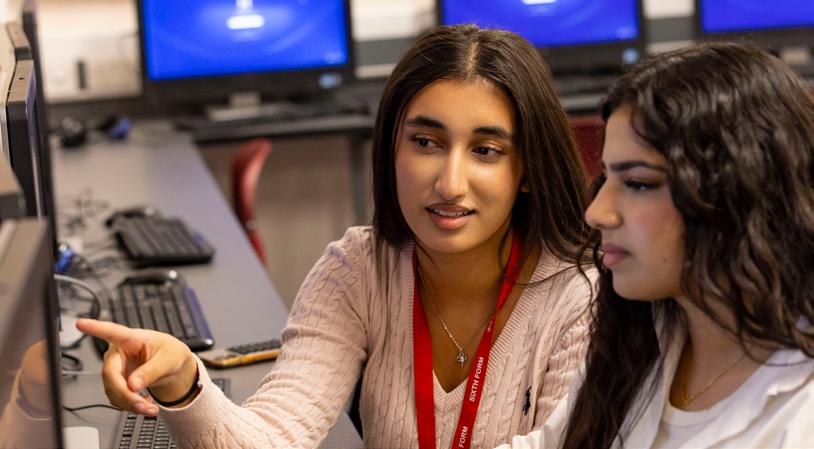

METHOD OF ASSESSMENT: Internal exams at the end of Year 12. A level exams at the end of Year 13 as well as 2 pieces of coursework.
ENTRY REQUIREMENTS: 5 in English Language (ideally grade 6 in English Literature) and 4 in Maths. 3 other subjects at 4 or above.
Welcome to A Level English Literature. This is a successful subject at A Level and we are all committed to taking you from your GCSE studies and equipping you for university study in this or other subjects. This course will deepen your knowledge of literature and support the development of your writing skills. You will be introduced to more challenging texts and will be expected to research topics which are of interest to you on the course. A Level English Literature is a highly regarded subject and complements a range of other subjects, including History, Philosophy and Ethics, Media and Psychology as well as the sciences. This is a great course for those wishing to pursue careers in a wide range of professions, including journalism, business, media, teaching, law and writing.
Component 1: Shakespeare
The Tempest
Component 1: Poetry pre-1900
Selected poetry of Christina Rossetti
Component 2 Prose post-1900
The Great Gatsby by F. Scott Fitzgerald
Component 2: Drama post-1900
A Raisin in the Sun Lorraine Hansberry
Component 1: Drama and Poetry pre-1900
The Duchess of Malfi by John Webster & Selected poems of Christina Rossetti
Component 1: Shakespeare (proposition and extract analysis)
The Tempest
Component 2: Comparative Contextual StudyAmerican Literature
The Great Gatsby by F. Scott Fitzgerald & Passing Nella Larson
Component 3: Literature post-1900 Coursework Linked Text
A Raisin in the Sun Lorraine Hansbury and Girl, Woman,Other Bernadine Evaristo
Component 3: Literature Post-1900 Coursework close reading/recreative
The World’s Wife by Carol Ann Duffy
EXAM BOARD: AQA

METHOD OF ASSESSMENT: 2 exams at the end of the year, each of 1 hour and 45 minutes. ENTRY REQUIREMENTS: Grade 3 or below in English Language. Students with Grade 4 will be permitted to retake if space permits.
Students aged 16 to 19 who wish to continue into further education must have a grade 4 or above in either GCSE English Literature or GCSE English Language. Many universities will be looking for a grade 5 GCSE in English Language. In order to secure funding for their further education course, students with a grade 3 or below must continue to study GCSE English Language.
PAPER 1
Time: 1 hour 45 minutes
Explorations in Creative Reading and Writing (50% of the GCSE assessed by External Examination)
PAPER 2
Time: 1 hour 45 minutes
Writers’ Viewpoints and Perspectives
(50% of the GCSE assessed by External Examination)
SPOKEN LANGUAGE
Students will be assessed for their ability to make a presentation, participate in an informed discussion and argue a point of view.


EXAM BOARD: AQA
METHOD OF ASSESSMENT: Completely coursework based. There is no exam. A report of about 5000 words plus your completed Log are sent off for moderation. Worth the same UCAS points as any AS’ Level.
ENTRY REQUIREMENTS: 5 in both English and Maths and 4 other subjects at 5 or above.
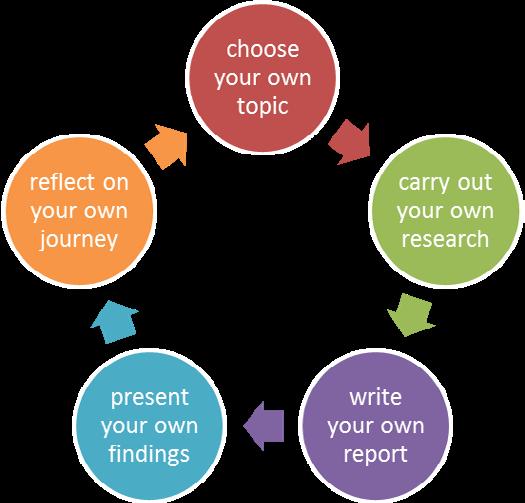
: 80 hours of independent study
This new and exciting course is unlike any other A’ level; as it has no set content Each student has the opportunity to decide their own topic of study and their own research question. You will be assigned a tutor who will help you carry out your research and put together your own report. You will complete a log charting your progress and give a presentation of your findings.
THE TAUGHT ELEMENT : 30 hours of guided study.
You will be taught all the skills and techniques you need to form a good research question, carry out the research and produce an outstanding report. (2 periods a week)
PROGRESSION PATHWAY:
This course prepares you like no other for university. It is highly valued by the Top Russell Group Universities. It will allow you to demonstrate independent working, analytical ability and the construction of a complex argument based on your own research. It can significantly enhance your personal statement.
EXAM BOARD: Eduqas

METHOD OF ASSESSMENT: 70% exam, 30% coursework ENTRY REQUIREMENTS: 4 in English and 4 in Maths & 3 other subjects at 4 or above
Students will gain a deeper understanding, appreciation and enjoyment of film. Film was the major art form of the twentieth century and it is a cultural form that is still of great significance at the beginning of the new millennium.
Component 1: Varieties of film and filmmaking
Written examination: 2½ hours
35% of qualification
This component assesses knowledge and understanding of six feature-length films.
Section A: Hollywood 1930-1990 (comparative study)
One question from a choice of two, requiring reference to two Hollywood films, one from the Classical Hollywood period (1930-1960) and the other from the New Hollywood period (1961-1990).
Section B: American film since 2005 /2012 (two-film study)
One question from a choice of two, requiring reference to two American films, one mainstream film and one contemporary independent film.
Section C: British film since 1995 (two-film study)
One question from a choice of two, requiring reference to two British films.
Component 2: Global filmmaking perspectives
Written examination: 2½ hours
35% of qualification
This component assesses knowledge and understanding of five feature-length films (or their equivalent).
Section A: Global film (two-film study)
One question from a choice of two, requiring reference to two global films: one European and one produced outside Europe.
Section B: Documentary film
One question from a choice of two, requiring reference to one documentary film.
Section C: Film movements – Silent cinema
One question from a choice of two, requiring reference to one silent film or group of films.
Section D: Film movements – Experimental film (1960-2001)
One question from a choice of two, requiring reference to one film option.
Component 3: Production
Non-exam assessment
30% of qualification
This component assesses one production and its evaluative analysis. Learners produce either a short film (45 minutes) or a screenplay for a short film (1600-1800 words) plus a digitally photographed storyboard of a key section from the screenplay an evaluative analysis (1600 - 1800 words).
Film Studies offers valuable transferable academic skills which can be used to gain access to a wide range of other subject courses at degree level. Possible careers pathways are, extremely flexible. Contrary certain views film dies has been an extremely successful way for our students to gain access into excellent universities. Our high grades rewards students with sufficient UCAS points to enter almost any discipline.

EXAM BOARD: AQA
METHOD OF ASSESSMENT: Examinations
ENTRY REQUIREMENTS: 5 in English and 4 in Maths & 3 other subjects at 4 or above (to include 6 in French)
• Social Issues & Current trends: The changing state of the family, the digital world, youth culture: fashion & trends, music, television. Immigration, Integration & Racism.
• Artistic culture: Festivals & traditions, art & architecture, cultural life in Paris - past & present.
• French & the European Union, and Politics & Youth.
• Grammar: Pupils are expected to show understanding of a variety of grammar.
• Individual Research Project: Pupils choose a question on a topic of interest to them and which relates to a country or countries where German is spoken.
Unit 1: Listening, Reading and Writing Assessment: Externally examined written paper
AS Level: 1 hour 45 mins. Weighting: 45%
A Level: 2 hours 30 mins. Weighting 50%
Unit 2 : Writing Assessment: Translation & critical essay AS Level: One essay on chosen film or text; English to French translation. 1 hour 15 mins. Weighting: 25%
A Level: Two essays on chosen film and text. English to French translation. 2 hours. Weighting 20%
Unit 3: Speaking (topic discussion & question response) Assessment: Discussion, presentation
In the world of work, speaking a second language brings very marketable assets. At University it is possible to combine French with almost any other discipline.
A small book of French Verb tables.
A Higher level GCSE or A level revision guide with CD for Listening practice. It is important to listen to some French too. Take a long summer holiday!
STUDENT PERSPECTIVE
This course provides a lively, stimulating and challenging continuation from GCSE. The course demands cultural, social and grammatical awareness as you will explore a wide variety of themes relating to contemporary France. society, the world over! You will also get the opportunity to visit France..


EXAM BOARD: AQA
METHOD OF ASSESSMENT: Examinations
ENTRY REQUIREMENTS: 5 in English and 4 in Maths & 3 other subjects at 4 or above (to include 6 in German)
• Social Issues & Current trends: The changing state of the family, the digital world, youth culture: fashion & trends, music, television. Immigration, Integration & Racism.
• Artistic culture: Festivals & traditions, art & architecture, cultural life in Berlin - past & present.
• Germany & the European Union, Politics & Youth, German RE-unification & its consequences.
• Grammar: Pupils are expected to show understanding of a variety of grammar.
• Individual Research Project: Pupils choose a question on a topic of interest to them and which relates to a country or countries where German is spoken.
Unit 1: Listening, Reading and Writing Assessment: Externally examined written paper
AS Level: 1 hour 45 mins. Weighting: 45%
A Level: 2 hours 30 mins. Weighting 50%
Unit 2 : Writing Assessment: Translation & critical essay AS Level: One essay on chosen film or text; English to German translation. 1 hour 15 mins. Weighting: 25%
A Level: Two essays on chosen film and text. English to German translation. 2 hours. Weighting 20%
Unit 3: Speaking (topic discussion & question response) Assessment: Discussion, presentation
In the world of work, speaking a second language brings very marketable assets. At University it is possible to combine German with almost any other discipline.
A small book of German Verb tables.
A Higher level GCSE or A level revision guide with CD for Listening practice. It is important to listen to some German too. Take a long summer holiday!
This course provides a lively, stimulating and challenging continuation from GCSE. The course demands cultural, social and grammatical awareness as you will explore a wide variety of themes relating to contemporary German society, the world over! You will also get the opportunity to visit Germany.
METHOD OF ASSESSMENT: This is a two year course that will be assessed at the end of the second year by two written examinations and a 3000-4000 word fieldwork investigation.
ENTRY REQUIREMENTS: 5 in English and Maths and 3 other subjects at 4 or above (to include 6 in Geography).
Unit 1: Physical geography
Section A: Water and carbon cycles
Section B: Coastal systems and landscapes
Section C: Hazards
Unit 1 exam: Written examination: 2 hour and 30 minutes, 40% of the qualification. The examination may include multiple-choice questions, short open, open response, calculations and resource-linked questions.
Unit 2: Human Geography
Section A: Global systems and global governance
Section B: Changing places
Section C: Population and the environment
Unit 2 exam: Written examination: 2 hour and 30 minutes, 40% of the qualification. The examination may include multiple-choice questions, short open, open response, calculations and resource-linked questions and extended writing questions.
Unit 3: Geography Fieldwork investigation
Students must complete a minimum of four days of field-work. Fieldwork must be carried out in relation to physical and human geography. Students complete an individual investigation which must include data collected in the field. The individual investigation must be based on a question or issue defined and developed by the student relating to any part of the specification content.
Students of Geography are well prepared for the world outside. The subject contains many key skills which are relevant to almost any career or degree course. There are a huge variety of career paths that Geography relates to - please speak to the contact teachers!


EXAM BOARD: Edexcel
METHOD OF ASSESSMENT: Units 1-3 Exams and Unit 4 Coursework.
ENTRY REQUIREMENTS: 4 in English and Maths & 3 other subjects at 4 or above (to include 5 in History)
Unit 1: In search of the American dream: The USA 1917-96.
Students will learn about the dramatic political, economic and social transformation of the USA in the twentieth century, an era that saw the USA challenged by the consequences of political, economic and social inequalities at home and of its involvement in International conflict
Unit 2: South Africa, 1948-94: from apartheid state to ‘rainbow nation.’
Students will learn about the transition from White minority rule to free elections in 1994. We will look at the creation of the apartheid regime and the methods used to overthrow apartheid.
Unit 3: Lancastrians, Yorkists and Henry VII, 1399-1509
We will look at the dramatic developments in late medieval England that centred around the personalities and skills of a series of Kings, Queens and powerful subjects during the fight for the throne of England
Unit 4: Historical Enquiry: 20th Century International Relations, 1879-1980. You will complete an assignment in which you are to analyse and evaluate different interpretations. Maximum: 4,000 words
With A level History, you will learn critical thinking skills, excellent writing skills and public speaking skills that translate well into the world of work.
Because the skills gained by History A-level are so wide-ranging, the skills you gain are required by almost every type of employer. If you continue by going for a Bachelor’s degree in History you have the opportunity to have a career as a research assistant or a management trainee. Your career opportunities will widen dramati-cally if you also have a Master’s degree or doctorate in History. Furthermore, It’s rare to be able to walk straight into a history-related occupation upon graduating. Such careers need to be planned for, as they usually need some extra study or training. However, history graduates gain so many transferable skills that employers in business, government and education are often keen to recruit you. Such skills include research, communication and statistical methods. Your employability will be enhanced if you undertake work experience and relevant post-graduate qualifications.
EXAM BOARD: Cisco Networking Academy
METHOD OF ASSESSMENT: Chapter Examinations and Practical assessments
ENTRY REQUIREMENTS: Must be studying Level 3 qualifications
The Cisco Networking Academy® IT Essentials curriculum provides an introduction to the technical skills needed to help meet the growing demand for entry-level ICT professionals. The curriculum covers the fundamentals of com-puter hardware and software as well as advanced concepts such as security, networking, and the responsibilities of an ICT professional. The curriculum offers the following benefits:
• Students develop working knowledge of how computers operate, how to assemble computers, and how to troubleshoot hardware and software issues.
• Hands-on labs and the Virtual Laptop and Virtual Desktop learning tools help students develop critical thinking and complex problem-solving skills. The course emphasizes the practical application of skills and procedures needed for hardware and software installations, upgrades, and troubleshooting.
• Cisco® Packet Tracer simulation-based learning activities promote the exploration of networking and network security concepts, while allowing students to experiment with network behaviour.
• Online assessments provide immediate feedback to support the evaluation of knowledge and acquired skills.
• The course helps students develop the career skills needed to successful communicate within an ICT business environment and interact with customers
Building a computer and installation of the motherboard, floppy and hard drives, CD-ROM, and video cards.
• Installing and managing Windows operating systems.
• Adding peripherals and multimedia capabilities.
• Implementing and using a local-area network architecture, networking protocols, and TCP/IP utilities.
• Maintaining and troubleshooting PC hardware and software.
IT Essentials: PC Hardware and Software is a hands-on, career-oriented e-learning solution with an emphasis on practical experience to help students develop fundamental computer skills, along with essential career skills. The curriculum helps students prepare for entry-level ICT career opportunities and the CompTIA A+ certification, which helps students differentiate themselves in the marketplace to advance their careers. In addition, ITE provides a learning pathway to the Cisco CCNA® curricula. After becoming certified, students will be qualified to work as computer support professionals and technicians in a variety of work environments and industries.
“The course is interesting and fairly easy for those who take a keen interest in ICT, but even if you are a beginner you can learn the information with the online materials! I’d recommend the course to anyone who takes an interest in ICT. It helps if you are open to new computing technologies and ideas as you study computing in depth on this course. I would like to become a Network Engineer by taking Cisco to the next level at University.”
EXAM BOARD: OCT

METHOD OF ASSESSMENT: There is one internally assessed unit which is marked and submitted to the exam board for moderation. Externally Examined units: these are the Mandatory units are examined in the January and June. Stu-dents are allowed one resit. Results are published in the March and August. ENTRY REQUIREMENTS: 5 in English and Maths & 3 other subjects at 4 or above
This is an industry approved course with a high focus on Global information and cyber-security. The OCR Level 3 Cambridge Technicals in IT are an Award that offers a thorough knowledge of IT. The Applied General Award is designed for those wishing to attend University or considering a route into the employment. The course has two Mandatory units in Year 12, the Fundamentals of IT and Global information, both externally examined. This accounts for 180 Guided Learning Hours.
In the second year students follow the Applied Award for progression to University or Apprentice. There is one Mandatory Unit on Cyber Security, externally assessed through formal examination.
There are two internally assessed units on Product development and on the Internet of Everything.
We have an outstanding record of consistently high results.
• Data Analyst
• Information Systems Manager
• Computer Scientist
• IT Consultant
• Systems Analyst
• Software Design
• Network Engineer
• Network Analyst
• Web Content Manager
• Cyber security analyst/investigator

EXAM BOARD: Edexcel
METHOD OF ASSESSMENT: Units 1-3 Exams and Unit 4 Coursework.

ENTRY REQUIREMENTS: 5 in English and Maths & 3 other subjects at 4 or above (to include 6 in History)
Students will undertake this GCSE course in Year 12 in preparation for them to retake the GCSE exam at the end of the year. Selected students may undertake a functional skills paper during the year which will be a stepping stone for them to retake GCSE the following year. Students who do not reach Grade 4 in Year 12 are required to continue the study of Maths into Year 13.
Completing this course successfully will allow you to access a variety of A level subjects. Strong numeracy skills are essential for; Accounting, Business Management, Investment, Banking, Engineering, Architecture, Computer Programming and careers in the sciences. Students aged 16 to 19 who wish to continue into further education must have a grade 4 or above in GCSE Mathematics. Many universities will be looking for a grade 5 GCSE in Maths. In order to secure funding for their further education course, students with a grade 3 or below must continue to study GCSE Maths.
The course will be assessed in November or at the end of the academic year through three written papers, each contributing one third of the final grade. One paper will be non-calculator and the other two calculator papers, each of length 1 hour 30 minutes.


EXAM BOARD: Edexcel
METHOD OF ASSESSMENT: The Math’s A Level course consists of two Core Pure Mathematics modules, one module on statistics and one module on mechanics. This specification has been designed for stu-dents who have a high ability in or are motivated by Mathematics.
ENTRY REQUIREMENTS: 7 in Maths and 5 in English & 3 other subjects at 6 or above.
This course is designed to develop and extend your mathematical knowledge and skills. These include the skill of working with mathematical information, as well as the ability to think logically and independently, consider accuracy, model situations mathematically, analyse results and reflect on findings. The core pure aspect of the course includes topics such as; Algebra, Geometry, Trigonometry, Calculus, Complex numbers, Matrices, Proof, Hyperbolic functions, Polar coordinates, Differential equations. This is a taught course which requires a lot commitment and dedication through self-study. During the course students will be expected to apply logic and use technology (such as computers and calculators) to generalise mathematics and take an increased responsibility for their own mathematical learning. They will be pro-vided with skill such a how to construct mathematical proofs, interpret problems and communicate their understanding of higher level mathematics.
This course is particularly appropriate for those students who expect mathematics to feature significant-ly in their higher education.
STUDENT PERSPECTIVE
A-Level Mathematics allows you to further enhance your analytical and quantitative skills, both of which are essential within any future career path. Although, at times it can be extremely challenging there is no better feeling than the sense of achievement once a solution is discovered. To succeed within the subject you must be prepared to work hard!

EXAM BOARD: Edexcel
METHOD OF ASSESSMENT: A level: three papers at the end of second year of study, 2 x 2 hour core pure papers and 1 x 1 hour applied (both Statistics and Mechanics assessed in one paper), all calculator.
ENTRY REQUIREMENTS: Grade 8 in GCSE Maths and 5 in GCSE English & 3 other subjects at 6 or above (students are also required to pass a baseline test).
There are many good reasons for you to take Further Mathematics:
• Students taking Further Mathematics overwhelmingly find it to be an enjoyable, rewarding, stimulating and empowering experience.
• For someone who enjoys mathematics it provides a challenge and a chance to explore new and/or more sophisticated mathematical concepts.
• It enables you to distinguish yourself as an able mathematician in the university and employment market.
• It will make the transition to a mathematics-related university course easier.
Further Mathematics is for students who have a proven mathematical ability. They will possess mathematical flair, passion and love for the subject. Many students will go on to read Mathematics at University or follow a course that has significant mathematical content .
You will be provided with skills such as: how to construct mathematical proofs; interpret problems and communicate correctly using correct mathematical grammar, notation and symbols. New topics include: complex numbers and matrices in Core Pure Maths.
Actuarial Science; Insurance; Pension Annuities, Banking & Commerce, and for many branches of Engineering it is desirable to have a Further Mathematics qualification.
If you are especially keen on Mathematics you will really enjoy the full A-level in Further Mathematics. It is a challenging qualification, but students who do it usually find it is their favourite subject.
Further Mathematics qualifications are prestigious and are strongly welcomed by universities. Students that do Further Mathematics are really demonstrating a strong commitment to their studies, as well as learning mathematics that is very useful for any maths-related degree.


EXAM BOARD: Eduqas
METHOD OF ASSESSMENT: 70% exam, 30% coursework
ENTRY REQUIREMENTS: 4 in English and 4 in Maths & 3 other subjects at 4 or above
COURSE CONTENT
This course offers students a unique insight into the mass media, developing a critical understanding of media products, industries and audiences across the worlds of print, radio, TV, film and new digital technologies. Media Studies is a stimulating, creative subject that helps students to develop skills and attitudes that are valuable for employment in any career. Through its study, students develop analytical, research and practical production skills and this course offers an excellent foundation for a wide range of careers in media industries such as advertising, journalism, graphic design, film, television and radio production, marketing and promotion or for those who wish to pursue further study.
Possible careers pathways are, extremely flexible. Contrary certain views media has been extremely successful in getting a very high percentage of our students into excellent universities. Our high pass rate rewards students with sufficient UCAS points to enter almost any discipline. Previous students have gone on to study careers ranging from law, architecture, accountancy, medicine, media studies, advertising, journalism, marketing and estate management to mention just a few.
We also enjoyed tremendous success in the students exit strategies in terms of going to good universities after doing this A-Level. It is recommended that students who take Media also take Film Studies. This combination of A level are widely accepted and encouraged by universities.
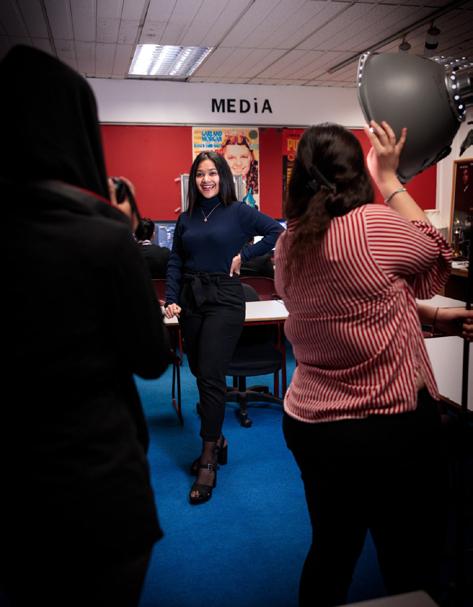
METHOD OF ASSESSMENT: Written examinations
ENTRY REQUIREMENTS: 5 in English and 4 in Maths & 3 other subjects at 4 or above (to include 6 in RE)
Section A: Christianity
Year 1
• Source of Wisdom and Authority
• God
• Self, Death and Afterlife
• Good Conduct and Key moral principles
• Expressions of Religious identity
Year 2
• Christianity, gender and sexuality
• Christianity and Science
• Christianity and the Challenge of Secularism
• Christianity, Migration and religious pluralism
Section B: Dialogue
• Between Christianity and Philosophy
• Between Christianity and Ethics
• Ethical theories
• Issues of human life and death
• Issues of animal life and death
This tests ethical understanding and consists of two compulsory two-part questions; in each two-part question the first part tests AO1 (15 marks) and the second part tests AO2 (15 marks).
An AS Level in Philosophy and Ethics is regarded highly by universities and may translate into a degree in Philosophy and Ethics, Philosophy, Politics and Economics or Theology; or work well with the sciences and humanities. Graduates in this subject go into Law, Civil Service, Politics, Business and Teaching.
Component 1 - Written exam: 3 hours, 100 marks, 50% of A Level
Section A: Christianity – two compulsory two-part questions worth 15 marks and 15 marks on philosophy of religion (60 marks).
Section B: Ethics – two compulsory two-part questions worth 15 marks and 15 marks on ethics and religion (60 marks).
Component 2 - Written exam: 1 hour , 60 marks, 33% of A Level
Study of religion – two compulsory two-part questions worth 15 marks and 15 marks relating to the religion chosen (60 marks).


EXAM BOARD: AQA
METHOD OF ASSESSMENT:Coursework unit and externally set exam (15 hours supervised time)
ENTRY REQUIREMENTS: 4 in English and 4 in Maths & 3 other subjects at 4 or above (to include 6 in Art or Photography)
‘A’ Level Photography is a stimulating two year course that mixes well with a range of other ‘A’ Level subjects and is of value even if students do not intend to make a career in Photography. The course is split into 2 units over the two years and students will be introduced to a variety of experi-ences that explore a range of photographic media, techniques and processes, which expand the depth of visual and aesthetic understanding. Students are expected to raise their technical skills while responding to set themes/projects to a very high standard while also experiencing new techniques, processes and ideas. These include Photoshop editing, Digital Manipulation, Studio, Darkroom and Photograms.
Students should also develop their critical and historical awareness of Photography and social/cultural influences on the Arts (i.e. keep annotated sketchbooks). In unit 1, an annotated study of one to three thousand words is required. Much of the work is of a personal nature and requires students to think and act independently both in school and at home. You must be active with your camera, responding to set themes and assignments, creating a portfolio of individual creative personal work inspired and informed by research into the work of others. You will also be expected to visit galleries as well as attending other Art Department trips.
Component 1 : Personal Investigation - Practical unit, chosen by the student to include a separate written essay (1000 -3000 words). No time limit, 60% of A Level. Set and marked in school moderated by AQA visit
Component 2 : Externally set assignment - Preparatory period plus 15 hours supervised time, 40% of A Level. Set by AQA, marked in school, moderated by AQA visit
Press photography, fashion photography, commercial photography, wedding photography, product photography, website photography.
METHOD OF ASSESSMENT: Physics A level is a linear assessment, with all exams at the end of the course. There are three examination papers which will test your knowledge, understanding and appli-cation of the topics below. There will be 12 required practicals which will be assessed in the three written exam papers. 15% of the A-level marks will be for practical knowledge and understanding.
ENTRY REQUIREMENTS: 6 in English and Maths & 4 other subjects at 6 or above (to include 7, 7 in science subjects at GCSE)
Core Content
• Measurements and their errors
• Particles and radiation
• Waves
• Mechanics and materials
• Electricity
• Further mechanics and thermal physics
• Fields and their consequences
• Nuclear physics
• Issues of human life and death
• Issues of animal life and death
Options
• Astrophysics
• Medical physics
• Engineering physics
• Turning points in physics
• Electronics
A Level Physics is a challenging subject that requires a high level of motivation. It enables you to develop personal skills such as problem solving, analysing detailed information, perception and interpretation of our physical environment. Within lessons we are able to work on group activities or on independent tasks. The course incorporates a number of modules which are stimulating in their depth and content. Alongside the modular exams there is an assessed practical that contributes to your final grade. After obtaining your grade, ‘A’ Level Physics is a highly valued subject by Higher Educational establishments in relation to such areas as Medicine, Engineering, Mathematics, Computing and Business.

EXAM BOARD: Edexcel
METHOD OF ASSESSMENT: 3 Examinations at the end of Year 13.
ENTRY REQUIREMENTS: 5 in English and Maths & 3 other subjects at 4 or above (to include 6 in a humanities subject). A keen interest in politics and current affairs is also essential.
Paper 1: UK Politics & Core Political Ideas (Year 1)
Students will learn about the key pillars that enable UK democ-racy to function and hold power accountable. Students will learn four content areas:
• Democracy & Participation
• Political Parties
• Electoral Systems
• Voting Behaviour and the Media Students will also cover core political ideas of Liberalism, Conservatism and Socialism.
Paper 2: UK Government & Non-Core Political Ideas (Year 1)
Students will learn about the functioning of political power in the United Kingdom. Students will cover four content areas:
• The Constitution
• Parliament
• Prime Minister and the Executive
• Relationships between the Branches of Government (including the Supreme Court). Students will also study the optional political idea as part of this paper.
Paper 3: Comparative Politics (US Politics) (Year 2)
Paper 3 focuses on the comparative element of the course. Students will study Democracy and Politics in the United States of America and draw direct comparisons with the political systems and politics of the United Kingdom. Students will study:
• The US Constitution and Federalism
• US Congress
• US Presidency
• US Supreme Court and US Civil Rights
• US Democracy and Participation
• Comparative Theories.
With A level Politics, you will learn critical thinking skills, excellent writing skills and public speaking skills that translate well into the world of work. Because the skills gained by Politics A-level are so wide-ranging, the skills you gain are required by almost every type of employer. If you continue by going for a Bachelor’s degree in social sciences and/or humanities you have the opportunity to have a career as a research assistant or a management trainee. Politics graduates gain so many transferable skills that employers in business, government and education are often keen to recruit you. Such skills include research, communication and statistical methods. Your employability will be enhanced if you undertake work experience and relevant post gradate qualifications.
EXAM BOARD: AQA
METHOD OF ASSESSMENT: Written examination and non exam assessment.

ENTRY REQUIREMENTS: 5 in English and Maths & 3 other subjects at 5 or above (to include 5 in a D&T subject). If you have not studied D&T at GCSE, please make an appointment with Mr Jefferies or Mr Mburu.
• Materials and their applications
• Design methods and processes
• Design theory
• Use industrial terminology, methods and procedures
• Focus on the needs of client, manufacturer, retailer, target market and potential users
• Utilise digital technology to enhance design and technology capability
• Use CAD/CAM related to the specific type of product or area of study
METHOD OF ASSESSMENT:
The exams and non-exam assessment will measure how students have achieved the following assessment objectives.
AO1: Identify, investigate and outline design possibilities to address needs and wants.
AO2: Design and make prototypes that are fit for purpose.
AO3: Analyse and evaluate:
• design decisions and outcomes, including for prototypes made by themselves and others
• wider issues in design and technology.
AO4: Demonstrate and apply knowledge and understanding of:
• technical principles
• designing and making principles.
Qualification Assessments
Paper 1– Technical principles– 100 Marks
Paper 2– Designing and making principles– 80 Marks
Non-exam assessment (NEA) - 100 Marks
Unit 3 - PROD3 Design and Manufacture 25% of A Level - 2 hour written paper
A good foundation for all careers in design, engineering, IT, manufacturing and teaching among many more. This course will enable you to study for a number of design related degrees at University. The course will give you the opportunity to build up a broad portfolio to impress future employers or university admission tutors.

EXAM BOARD: Edexcel
METHOD OF ASSESSMENT: This A Level course is comprised of both core and optional components arranged in 3 modules. Each module will be examined at the end of the second year. Each exam is 2 hours long. 6 hours
ENTRY REQUIREMENTS: 5 in both English & Maths and 3 other subjects at 4 or above (to include 5+ in a science subject– preferably Biology, but not essential).
This new course offers an engaging and effective introduction to Psychology which will appeal to a crosssection of students regardless of whether they have studied Psychology before. Psychology is an exciting investigation of how the human mind works and what motivates behaviour. The aim of Psychologists is to further our understanding of; the way in which people think and the reasons behind particular types of thoughts both normal and abnormal.
The course has compulsory core units such as Memory, Biological and Social Psychology. There are also various option modules such as Forensic Psychology and Gender.
Psychology opens a dynamic range of exciting careers from Journalism to criminal/forensic science. An understanding of Human Nature is important in many elements of business, but especially in Management and Marketing. Specialist Psychologists earn large salaries in the fields of Sports Psychology, Education, Mental Health, and Law.
Psychology combines well with English, Maths, Science, Sports Science, Law, History, IT and Business. Results have been excellent in recent years with the majority of students progressing to university.
The specific study of the mind and human behavior at ‘A’ Level has proved to be both challenging and stimulating. As it stems from philosophy, there are many opportunities to discuss the big questions such as what makes us Human? and do we have ‘Free will’? Lessons are based upon real research from both a scientific and subjective perspective. You will develop critical thinking, evaluative and data handling skills. You will also learn how to construct and communicate complex arguments.

METHOD OF ASSESSMENT: This qualification is linear. Linear means that students will sit all the A-level exams at the end of their A-level course. There are x3 exam papers each being 2 hrs long.
ENTRY REQUIREMENTS: 5 in English and Maths & 3 other subjects at 4 or above
• The study of society, in particular the western developed world.
• Explore the meaning of culture and identity to different groups in society.
• The study of structures and institutions in society such as education, government, media, religion, health care, the family, the workplace etc.
• Examines inequality, focusing on class, gender, ethnicity, age, sexuality and disability.
• Uses theoretical perspectives to analyse different social phenomena and social processes.
• Carries out research using a range of methods; interviews, questionnaires/surveys, experiments, observations, case studies, content analysis.
Paper 1: Education with Theory and Methods
Compulsory content 4.1.1, 4.1.2, 4.1.3
2 hour written exam
80 marks
33.3% of A-level
Paper 2: Topics in Sociology
Section A: one from option 1: 4.2.1, 4.2.2, 4.2.3 or 4.2.4
Section B: one from option 2: 4.2.5, 4.2.6, 4.2.7 or 4.2.8
2 hour written exam
80 marks
33.3% of A-level
Paper 3: Crime and Deviance with Theory and Methods
Compulsory content 4.3.1, 4.3.2
2 hour written exam
80 marks
33.3% of A-level
Sociology will prepare you for higher education and a wide range of careers from teaching, politics, social work, marketing, researchers and nursing to law and journalism to name just a few.
EXAM BOARD: AQA
METHOD OF ASSESSMENT: Examinations

ENTRY REQUIREMENTS: 5 in English and 4 in Maths & 3 other subjects at 4 or above (to include 6 in French)
COURSE CONTENT
• Social Issues & Current trends: The changing state of the family, the digital world, youth culture: fashion & trends, music, television. Immigration, Integration & Racism.
• Festivals & traditions, art & architecture, cultural life in Madrid - past & present.
• Spain & the European Union, and Politics & Youth.
• Grammar: Pupils are expected to show understanding of a variety of grammar.
• Individual Research Project: Pupils choose a question on a topic of interest to them and which relates to a country or countries where German is spoken.
Unit 1: Listening, Reading and Writing Assessment: Externally examined written paper
AS Level: 1 hour 45 mins. Weighting: 45%
A Level: 2 hours 30 mins. Weighting 50%
Unit 2 : Writing Assessment: Translation & critical essay AS Level: One essay on chosen film or text; English to French translation. 1 hour 15 mins. Weighting: 25%
A Level: Two essays on chosen film and text. English to French translation. 2 hours. Weighting 20%
Unit 3: Speaking (topic discussion & question response) Assessment: Discussion, presentation
In the world of work, speaking a second language brings very marketable assets. At University it is possible to combine French with almost any other discipline.
A small book of Spanish Verb tables.
A Higher level GCSE or A level revision guide with CD for Listening practice. It is important to listen to some French too. Take a long summer holiday!
This course provides a lively, stimulating and challenging continuation from GCSE. The course demands cultural, social and grammatical awareness as you will explore a wide variety of themes relating to contemporary Spain. society, the world over! You will also get the opportunity to visit Spain.

EXAM BOARD: Edexcel
METHOD OF ASSESSMENT: 7 units over 2 years, allowing A levels to be studied alongside. 1 unit is completed as an external exam, 1 other unit is completed as a controlled as-sessment. The remaining units are coursework based
ENTRY REQUIREMENTS: 4 in English and Maths & 3 other subjects at 4 or above. BTEC Level 2 Extended Certificate– Merit or above.
COURSE CONTENT
• Anatomy and Physiology in Sport
• Fitness Training and Programming for Health Sport and well being
• Professional Development in the Sports industry
• Sports Leadership
• Application of Fitness Testing
• Sports Psychology METHODS OF STUDY
• Exam
• Case Study Controlled assessment
• Research
• Practical Performance
• Application of Sports Science to
• Improve Performance
CAREER PATHWAYS
Opportunity for employment within the sports industry or to continue with further education in sport.
COURSE ELIGIBLE FOR THE HARLINGTON SPORTS ACADEMY.

EXAM BOARD: Edexcel

METHOD OF ASSESSMENT: 9 units over 2 years, as well as training with Uxbridge football club. 3 units are externally assessed. The remaining units are coursework based. Equivalent to 2 A Levels
ENTRY REQUIREMENTS: 4 in English and Maths & 3 other subjects at 4 or above. BTEC Level 2 Extended Cer-tificate– Merit or above.
• Anatomy and Physiology in Sport (External Exam)
• Fitness Training and Programming for Health Sport and well being (External Synoptic)
• Investigating business in Sport and the active leisure industry (External Synoptic)
• Skill Acquisition (Coursework)
• Professional Development in the Sports industry (coursework)
• Sports Leadership (Coursework)
• Application of Fitness Testing (Coursework)
• Sports Psychology (Coursework)
• Practical Performance (Coursework)
METHODS OF STUDY
• Exam
• Case Study Controlled assessment
• Research
• Practical Performance
• Application of Sports Science to
• Improve Performance
• Work experience
CAREER PATHWAYS
Opportunity for employment within the sports industry or to continue with further education in sport. Continue to play for Uxbridge youth team and develop within the club.
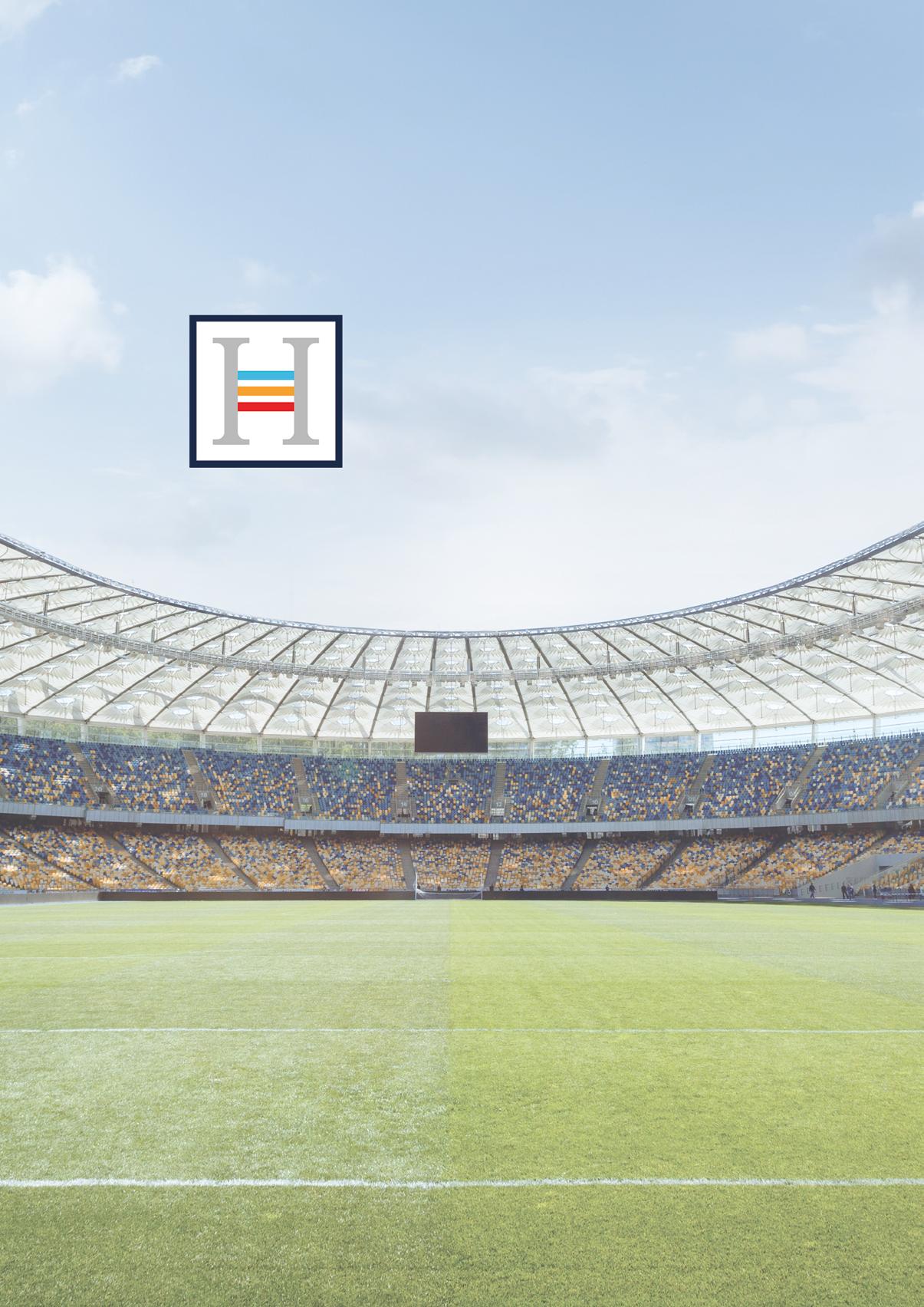


EXAM BOARD: AQA
METHOD OF ASSESSMENT: Coursework unit and externally set exam (15 hours supervised time)
ENTRY REQUIREMENTS: 5 in English and 4 in Maths & 3 other subjects at grade 4 or above (to include 6 or above in either Art or Textiles)
A Level Textiles is a stimulating two year course that mixes well with a range of other ‘A’ Level subjects and is of value even if students do not intend to make a career in Textiles. The course is split into 2 units over two years. They will be introduced to a variety of experiences that explore a range of textile techniques, media and processes, which expand the depth of visual and aesthetic understanding . Students should also develop their critical and historical awareness of the arts and textiles as well as social/ cultural influences on the Arts (i.e. keep annotated sketchbooks). In unit 1 an annotated study of one to three thousand words is required. Unit studies include embroidery, dyeing, printing, fabric manipulation and mixed media. Much of the work is of a personal nature and requires students to think and act independently both in school and at home. During the course, students are expected to visit galleries, fashion events as well as attending other Art/textiles Department trips.
Component 1: Personal Investigation – Practical unit, chosen by the student to include a separate written essay (1000 -3000 words). No time limit, 60% of A Level. Set and marked in school moderated by AQA visit.
Component 2: Externally set assignment - Preparatory period plus 15 hours supervised time, 40% of A Level. Set by AQA, marked in school, moderated by AQA visit.
A good foundation for all careers in both Textiles and Arts industries, with further opportunities in areas such as Art College, further education or entry positions in the retail industry. A career in textile, fashion design, interior and fashion marketing. This course will give you/students the opportunity to build a broad portfolio. Basic for all careers in art teaching, e.g. graphics, fashion, textile design, 3D design, media work, marketing, display of product, film and TV, computer design, photography, new media.
COURSE QUALIFICATION LEVEL SUBJECT SPECIFIC CRITERIA
ART A level 3 4 in English and 3 other subjects at 4 or above (to include 6 in Art)
BIOLOGY A level 3 6 in both English & Maths and 4 other subjects at 6 or above (to include 7, 7 in sciences)
BUSINESS A Level 3 4 in both English & Maths and 3 other subjects at 4 or above
CHEMISTRY A Level 3 6 in both English & Maths and 4 other subjects at grade 6 (to include 7, 7 in sciences)
CLASSICAL CIVILISATION A Level 3 5 in both English & Maths and 4 other subjects at grade 5 (5 in History or RE desirable)
COMP SCIENCE A level 3 4 in English and 6 in Maths and 3 other subjects at 4 or above (to include 6 in Computing if taken as a GCSE option)
ECONOMICS A Level 3 5 in both English & Maths and 3 other subjects at 4 or above
ENGLISH LANGUAGE GCSE Retake 2 3 or below in GCSE English Language
ENGLISH LITERATURE A Level 3 5 in English Language (ideally a grade 6 in English Literature also) & 4 in Maths and 3 other subjects at 4 or above
FILM STUDIES A Level 3 4 in both English & Maths and 3 other subjects at 4 or above
GEOGRAPHY A Level 3 4 in both English & Maths and 3 other subjects at 4 or above (to include 5 in Geography)
HISTORY A Level 3 4 in both English & Maths and 4 other subjects at 4 or above (to include 5 in History)
I.T. Cambridge Technical 3 5 in both English & Maths and 3 other subjects at 4 or above
MATHEMATICS A Level 3 7 in Maths & 5 in English and 3 other subjects at grade 6 or above*
MATHS: FURTHER A Level 3 8 in Maths & 5 in English and 3 other subjects at 6 or above**
MATHEMATICS GCSE Retake 2 3 or below in GCSE Mathematics
MEDIA STUDIES A Level 3 4 in both English & Maths and 3 other subjects at 4 or above
PHOTOGRAPHY A Level 3 4 in English and 3 other subjects at 4 or above (to include 6 in Art or Photography)
PHILOSOPHY A Level 3 5 in both English & Maths and 3 other subjects at 4 or above (to include 6 in RE)
PHYSICS A Level 3 6 in both English & Maths and 4 other subjects at 6 or above (to include 7, 7 in sciences)**
POLITICS A Level 3 5 in both English & Maths and 3 other subjects at 4 or above (to include a 6 in a humanities subject)
PSYCHOLOGY A Level 3 5 in both English & Maths and 3 other subjects at 4 or above (to include a 5 in a science subject- preferably Biology, but not essential)
PRODUCT DESIGN A Level 3 4 in both English & Maths and 3 other subjects at 4 or above (to include 5 in a DT subject)
SOCIOLOGY A Level 3 5 in both English & Maths and 3 other subjects at 4 or above
SPORT SCIENCE Nat Ext Certificate 3 4 in both English & Maths and 3 other subjects at 4 or above
SPORTS ACADEMY National Diploma 3 4 in both English & Maths and 3 other subjects at 4 or above. Must play football to a high standard and pass a trial EXTENDED PROJECT EPQ AS 3 5 in both English & Maths and 4 other subjects at 5 or above
CISCO IT Essentials n.a. Must be studying Level 3 qualifications
*must also pass an algebra test in September **must also be studying regular A level Mathematics
PLEASE NOTE: For any subject that may be over/under subscribed following the formal application process and/or enrolment session on GCSE results day, places on courses may be determined through Ascending/Descending Grade Point Averages alongside any grade in that specific subject.

